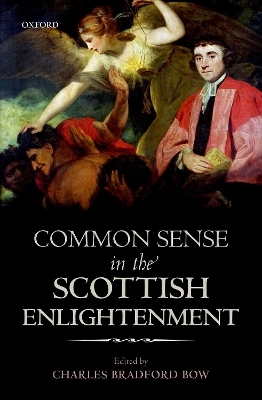
Common Sense in the Scottish Enlightenment
Oxford University Press (Verlag)
978-0-19-878390-9 (ISBN)
Common sense philosophy was one of eighteenth-century Scotland's most original intellectual products. It developed as a viable alternative to modern philosophical scepticism, known as the 'Ideal Theory' or 'the way of ideas'. The nine specially written essays in this volume explore the philosophical and historical significance of common sense philosophy in the Scottish Enlightenment. Thomas Reid and David Hume feature prominently as influential authors of competing ideas in the history and philosophy of common sense. The contributors recover anticipations of Reid's version of common sense in seventeenth-century Scottish scholasticism; revaluate Reid's position in the realism versus sentimentalism dichotomy; shed new light on the nature of the 'constitution' in the anatomy of the mind; identify changes in the nature of sense perception throughout Reid's published and unpublished works; examine Reid on the non-theist implications of Hume's philosophy; show how 'polite' literature shaped James Beattie's version of common sense; reveal Hume's response to common sense philosophers; explore English criticisms of the Scottish 'school', and how Dugald Stewart's refashioning of common sense responded to a new age and the British reception of German Idealism. In recovering the ways in which Scottish common sense philosophy developed during the long eighteenth century, this volume takes an important step toward a more complete understanding of 'the Scottish philosophy' and British philosophy more broadly in the age of Enlightenment.
Bradford Bow is Assistant Professor of Intellectual History at Yonsei University. He held postdoctoral positions at the Institute for Advanced Studies in the Humanities, the Huntington Library, and a teaching fellowship in the History of Enlightenment at Edinburgh University. His research interests revolve around the intellectual and cultural history of the eighteenth- and nineteenth-century Atlantic world with a particular emphasis on Enlightenment(s).
C. B. Bow: Introduction: Common Sense in the Scottish Enlightenment
1: Giovanni Gellera: Common Sense and Ideal Theory in Seventeenth Century Scottish Philosophy
2: Gordon Graham: Was Reid a Moral Realist?
3: Claire Etchegaray: Reid on Our Mental Constitution
4: Giovanni B. Grandi: On the Ancestry of Reid's Inquiry: Stewart, Fearn, and Reid's Early Manuscripts
5: Esther Engel Kroeker: Reid's Response to Hume's Moral Atheism: Reid on Morality, Common Sense, and Theism
6: R. J. W. Mills: The Common Sense of a Poet: James Beattie's Essay on Truth (1770)
7: James A. Harris: Hume and the Common Sense Philosophers
8: Paul B. Wood: The 'New Empire of Common Sense': The Reception of Common Sense Philosophy in Britain, 1764-1793
9: C. B. Bow: Dugald Stewart and the Legacy of Common Sense in the Scottish Enlightenment
| Erscheinungsdatum | 09.05.2018 |
|---|---|
| Reihe/Serie | Mind Association Occasional Series |
| Verlagsort | Oxford |
| Sprache | englisch |
| Maße | 164 x 242 mm |
| Gewicht | 520 g |
| Themenwelt | Geschichte ► Allgemeine Geschichte ► Neuzeit (bis 1918) |
| Geisteswissenschaften ► Geschichte ► Regional- / Ländergeschichte | |
| Geschichte ► Teilgebiete der Geschichte ► Kulturgeschichte | |
| Geisteswissenschaften ► Philosophie ► Geschichte der Philosophie | |
| Geisteswissenschaften ► Philosophie ► Philosophie der Neuzeit | |
| ISBN-10 | 0-19-878390-6 / 0198783906 |
| ISBN-13 | 978-0-19-878390-9 / 9780198783909 |
| Zustand | Neuware |
| Haben Sie eine Frage zum Produkt? |
aus dem Bereich


